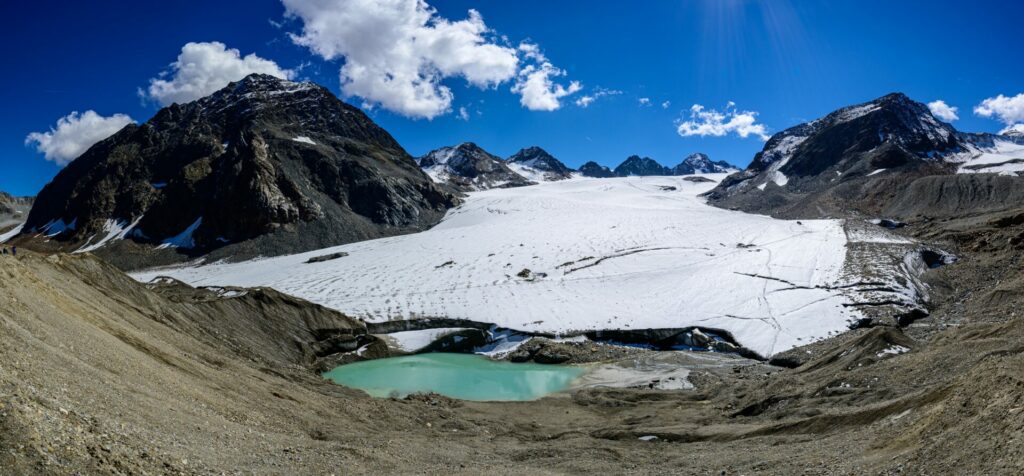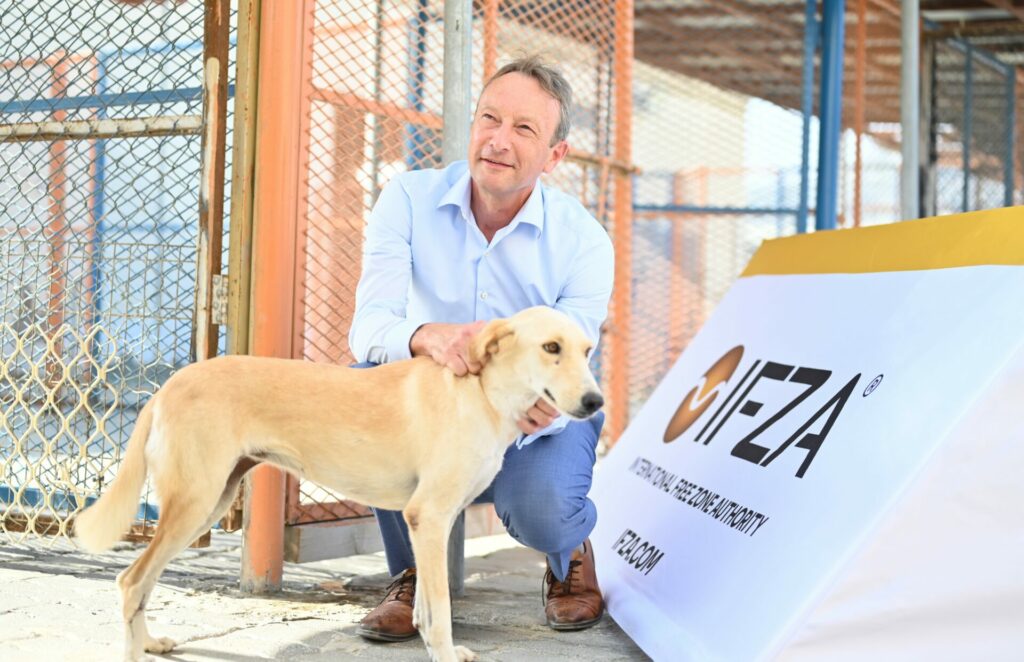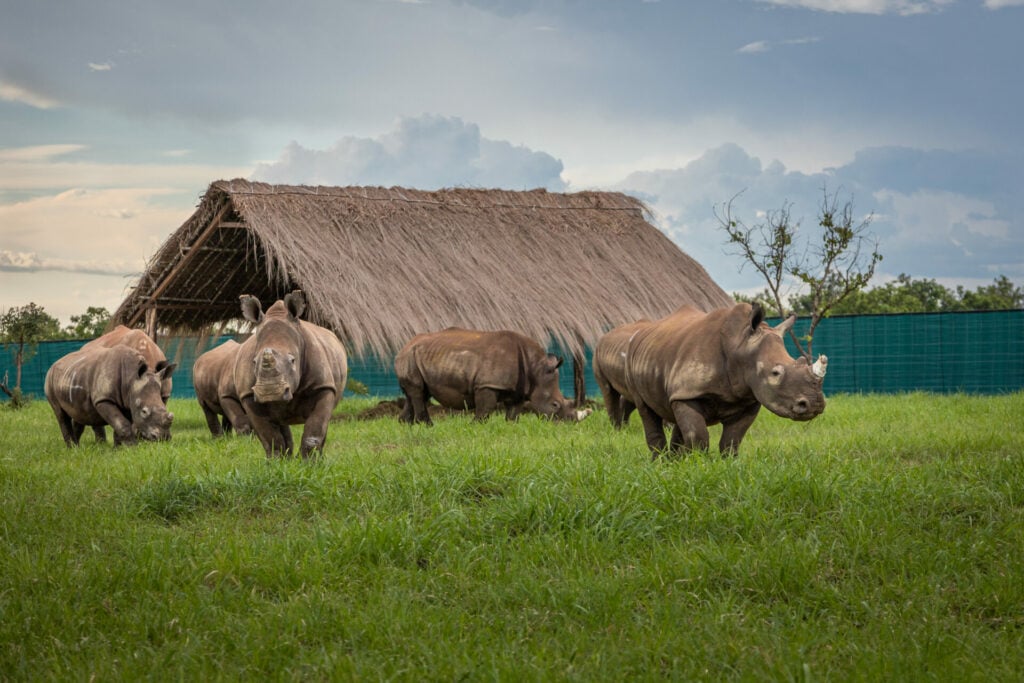Malcolm Wood skis swiftly to the edge of the icy cliff, snow swirling at his sides. In one single move his skis leave the ground, and paraglider billowing open, finds himself soaring under the brilliant blue sky in Peru’s snowcapped Andes. From exposed rocks that leave a stark contrast between ice-covered areas, to newly formed glacial lakes, this birds-eye perspective of the South American mountain range shows evidence of climate change at every angle.
Highlighting the critical issue of melting glaciers and the urgent need for climate action is why this British-Chinese social entrepreneur, who was named one of Asia’s most influential people in 2023, has been daringly combining skiing with paragliding to produce his latest documentary, The Last Glaciers. It’s a unique and powerful means of bringing attention to yet another repercussion of rising temperatures, the rapid melting of glaciers in the world’s mountain ranges.

While Malcolm is widely recognised as a restaurateur – Mott 32, his fine dining restaurant in Dubai and seven other countries, has been labelled one of the best Cantonese restaurants in the world – he is also an adventurer, a filmmaker and a environmental ambassador. Driven by a passion for the world around him, Malcolm has utilised his various platforms to raise awareness about global issues. Something, he tells The Ethicalist, was instilled in him from a young age.
‘In the Cordillera Blanca, the loss of glaciers will effectively switch off the tap, leaving 100 million people downstream without fresh water. And that’s going to happen all over the world. It’s one of the biggest fallouts of climate change’
‘I was always passionate about the environment,’ he explains. ‘I did a lot of adventuring with my father when I was young. He put me on skis when I was two, sailed me solo through storms for months, we used to do trips on our own through Africa in a small car. As a young person I was exposed to a lot, and fell in love with the environment.’

For the last seven years – between running restaurants, investing in startups, raising two kids, and enjoying extreme athletics – Malcolm has been collaborating with award-winning filmmaker Craig Leeson on the recently released documentary ‘The Last Glaciers.’ The feature film, which was shot in twelve countries including Antarctica and the Himalayas, and can be watched on olyn.com, documents the dramatic loss of ice worldwide and reveals for the first time, the extent to which melting glaciers will cause global mass migration.
‘Why would people care about glaciers?’ Malcolm asks.‘Glaciers provide fresh water for one-third of the world’s population. In the Cordillera Blanca, the loss of glaciers – which will happen within 40 years – will effectively switch off the tap, leaving 100 million people downstream without fresh water. And that’s going to happen all over the world. It’s one of the biggest fallouts of climate change.’
‘There’s a dangerous mentality emerging where people believe their individual actions have little impact, causing them to give up on addressing climate change altogether’
The documentary marks the second collaboration between Malcolm and Craig, following the successful release of ‘A Plastic Ocean’ in 2017. A trip the same year to the Alps had shocked Craig after witnessing the deaths of mountaineers due to an avalanche on Europe’s highest peak, Mont Blanc. Propelled to raise awareness of the world’s critically threatened mountain ranges, Craig and Malcom found the opportunity to collaborate once more.

‘The Last Glaciers is the first documentary to clearly depict why losing glaciers is so important,’ Malcolm explains. ‘When I started filming it, even I was unaware of the severity of the issue. My initial motivation was just to create a film that would help my nine-year-old son understand climate change more easily. At the time we began filming seven years ago, about 50 percent of Americans didn’t believe in climate change, which was quite alarming.’
Filmmaker, Entrepreneur, Changemaker
Malcolm’s dedication to raising awareness about the consequences of climate change go beyond his role as a father and filmmaker. His efforts have also caught the attention of the United Nations, leading to an invitation to join their Mountain Hero ambassador program. Alongside other famous athletes including Canadian ice-climber Will Gadd, Kenyan Olympic skier Sabrina Simader and adventurer Ben Fogle, the team draw attention to environmental issues affecting mountains including climate change, waste and biodiversity loss.

While this opportunity has given him a global platform to continue raising awareness, Malcolm is noticing a worrying shift in public concern for environmental issues.
‘Studies are finding testosterone levels in young boys have dropped significantly – some even say up to 70 percent – compared to 20 years ago due to microplastics’
‘None of the platforms seem interested in climate change films,’ he explains, ‘they want entertainment, and they’re choosing to ignore the issues at hand. There’s a dangerous mentality emerging where people believe their individual actions have little impact, causing them to give up on addressing climate change altogether.’
Plastic pollution problem
Malcolm also observes a similar trend in the realm of plastic pollution. ‘We’re in a similar state with plastic pollution. We’re all aware of the problems and solutions surrounding our plastic waste but we don’t do anything about it. According to statistics we’re going to produce three times more plastic in the next five years than the previous ten.’
Malcolm’s commitment to tackling plastic pollution stems from the first documentary he created with Craig, A Plastic Ocean – one of the most awarded documentaries in 2017 and called the most significant film of our times by Sir David Attenborough. Through powerful visuals and interviews with scientists, environmentalists and local communities, the documentary sheds light on the critical state of our oceans with marine life simply drowning in plastic debris.

‘Through that production, I learned a lot about plastics’ Malcolm explains. ‘It was the first documentary to shed light on the way by which plastics get into our food chain and the relationship between human health and microplastics. That was 2017 and today 100 per cent of tested placentas contain microplastics. Studies are finding testosterone levels in young boys have dropped significantly – some even say up to 70 percent – compared to 20 years ago due to microplastics.’
Malcolm Wood the Restaurateur
This newfound knowledge prompted Malcolm to take a closer look at his own businesses, particularly his restaurants. ‘When you run a restaurant, you are taking from the land so you need to be aware of where your food comes from and how it’s sourced,’ he emphasises. ‘In cities like Dubai or Hong Kong, it’s especially important to take an interest in your ingredients because so much of it is imported.’
For Malcolm, creating more sustainable dining options has become a priority. ‘We started offering plant-based alternatives for all our signature dishes at Mott 32,’ he says. ‘If I went completely plant-based overnight, I’d risk losing my audience. Instead, by providing these alternatives, we can educate our customers and encourage them to make more eco-friendly choices. It’s a process of education’

Malcolm’s commitment to creating more sustainable dining options is an example of the ‘first step’ he encourages people to take in order to address environmental issues.
‘Once you have the awareness, you have to try to take the approach to change it’ he explains. ‘I think people need to realise that we’re all part of the problem. Yes, you can get attacked for anything that you do. If you don’t do anything, you generally don’t get attacked. If you do something but it’s not perfect, then you open yourself up to attack. But you’ve got to take that first step to do something.
‘I’m part of the problem,’ he adds candidly. ‘I’m not pretending that I’m here solving them all. If everyone had that mentality, we’d all be taking the first step together, and not pointing the finger.’
You can watch The Last Glaciers here









